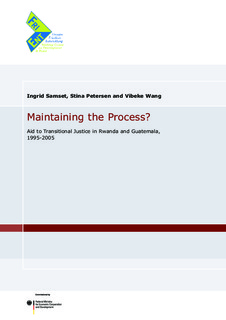Maintaining the Process? Aid to Transitional Justice in Rwanda and Guatemala, 1995-2005
Research report

Permanent lenke
http://hdl.handle.net/11250/2474771Utgivelsesdato
2007-11-28Metadata
Vis full innførselSamlinger
- Publications [1488]
Originalversjon
Bonn: Working Group on Development and Peace (FriEnt) 42 p.Sammendrag
This report assesses the aid that was given in support of transitional justice processes in Rwanda and Guatemala between 1995 and 2005. The analysis is based on statistical data from the main donor agencies involved and on interviews with key donor representatives. The share of the aid that went to transitional justice constituted merely five percent of total development aid over the 11-year period. More than half of the transitional justice aid went to reforms of the security sector (SSR). The remainder was targeted differently: in Rwanda roughly 20 percent of the transitional justice support went to criminal courts and an equal share at the gacaca process; while in Guatemala, the non-SSR transitional justice aid went to the country's two truth commissions and to reparations attempts. Aid was also sequenced differently: in Rwanda the transitional justice area received relatively little support during the first half of the post-conflict period, while in Guatemala aid levels were rather high from the outset. Donors justified their aid similarly, but chose different strategies to channel it in. In Guatemala they channelled most of the transitional justice assistance through multilateral organisations, while in Rwanda most went to the national government. In Rwanda the aid was also best coordinated, whereas uncertainties and a lack of commitment as regards coordination prevailed in Guatemala. The report concludes that aid in the transitional justice field, while rooted in local ownership, should be maintained only if helps reach key aims of transitional justice such as truth, restitution, accountability and reconciliation. It also recommends transitional justice donors to strike a balance between the different mechanisms they support, and to anchor strategies in a better mapping of how different groups in the recipient country relate to the troublesome past and wish to deal with it.